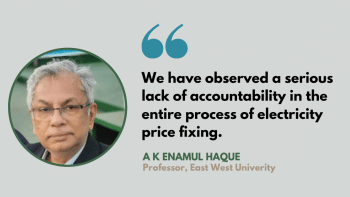Why must consumers always be the punching bag?

In the midst of the worst cost-of-living crisis in over a decade, the Bangladesh Energy Regulatory Commission (BERC) has decided to raise the bulk electricity price by a whopping 19.92 percent, signalling the beginning of another bout of inflation in the country. From next month, the six state-owned distributor companies will have to purchase electricity from the Bangladesh Power Development Board (BPDB) at Tk 6.20 per kilowatt hour (kWh), up from Tk 5.17 at present.
What does this mean for end consumers, who are already drowning in an increasingly harsh economic landscape where the cost of every essential item has increased manifold since the beginning of the year? More misery in the coming days, to be sure, despite assurances from the state minister for power, energy and mineral resources that retail electricity prices will not increase now. But in what alternate reality can we expect distribution companies to absorb the rise in cost themselves and look out for the best interests of consumers when the government itself won't do the same? In fact, the distribution companies have already submitted their proposals for a price hike to BERC, and it's only a matter of time before the burden is passed down to the consumer.
This year has witnessed the ruthless return of loadshedding, with power outages taking place as often as eight to ten times a day, thanks to years of misguided energy policies that prioritised the interests of a few powerful blocs over the people. Although loadshedding has decreased now as a result of cooler weather, it will inevitably return with a vengeance as summer rolls in next year, especially if the gas crisis persists and LNG prices continue to be high in the global market. The government, unfortunately, is yet to present a viable and cost-effective alternative to get the country out of the energy crisis.

What makes the decision to hike electricity prices all the more upsetting and unjustifiable is the callous refusal of the government to rectify the widespread irregularities and mismanagement plaguing the power sector. More than 50 percent of BPDB's operating expenses go towards paying capacity charges to independent power producers and for quick rentals to sit idle, of which an overwhelming majority goes to just 12 firms. Despite widespread criticism of the absurdity of paying approximately Tk 90,000 crore as capacity charges, over the past 11 years, we have not received any convincing answers from the government as to why they took this decision, nor whether they will end the contracts anytime soon.
Meanwhile, according to a recent study, the BPDB purchased electricity from some power plants at a 25 percent higher price, while the leasing of government land in the form of subsidies to some plants led to a 15 percent rise in power prices. Why should the people be asked to pay for these collusive and corrupt decisions, which are driving the price of electricity upwards?
The irregularities and lack of accountability in the power sector – and energy sector at large – needs to be addressed first before any demands can be made on consumers to pay higher prices. It's time for policymakers and state institutions to abandon their reckless energy policies and remind themselves who they are bound to serve: the people.


 For all latest news, follow The Daily Star's Google News channel.
For all latest news, follow The Daily Star's Google News channel. 








Comments